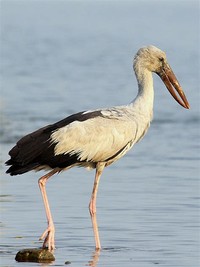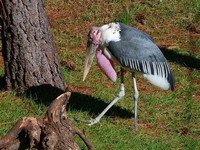Types of Storks

The Asian openbill or Asian openbill stork (Anastomus oscitans) is a large wading bird in the stork family Ciconiidae. This distinctive stork is found mainly in the Indian subcontinent and Southeast Asia.

The black-necked stork (Ephippiorhynchus asiaticus) is a tall long-necked wading bird in the stork family. It is a resident species across the Indian Subcontinent and Southeast Asia with a disjunct population in Australia.

The white stork (Ciconia ciconia) is a large bird in the stork family Ciconiidae. Its plumage is mainly white, with black on its wings. Adults have long red legs and long pointed red beaks, and measure on average 100–115 cm (39–45 in) from beak tip to end of tail, with a 155–215 cm (61–85 in) wingspan.

The greater yellow-headed vulture (Cathartes melambrotus), also known as the forest vulture, is a species of bird in the New World vulture family Cathartidae. It was considered to be the same species as the lesser yellow-headed vulture until they were split in 1964.

Leptoptilos is a genus of very large tropical storks. The name means thin (lepto) feather (ptilos). Two species are resident breeders in southern Asia, and the marabou stork is found in Sub-Saharan Africa.

The lesser yellow-headed vulture (Cathartes burrovianus) also known as the savannah vulture, is a species of bird in the New World vulture family Cathartidae. It was considered to be the same species as the greater yellow-headed vulture until they were split in 1964.

The marabou stork (Leptoptilos crumenifer) is a large wading bird in the stork family Ciconiidae. It breeds in Africa south of the Sahara, in both wet and arid habitats, often near human habitation, especially landfill sites.

Mycteria is a genus of large tropical storks with representatives in the Americas, east Africa and southern and southeastern Asia.Two species have "ibis" in their scientific or old common names, but they are not related to these birds and simply look more similar to an ibis than do other storks.

The openbill storks or openbills are two species of stork (family Ciconiidae) in the genus Anastomus. They are large wading birds characterized by large bills, the mandibles of which do not meet except at the tip. This feature develops only in the adults. Both species feed predominantly on molluscs.

The painted stork (Mycteria leucocephala) is a large wader in the stork family. It is found in the wetlands of the plains of tropical Asia south of the Himalayas in the Indian Subcontinent and extending into Southeast Asia.

The saddle-billed stork (Ephippiorhynchus senegalensis) is a large wading bird in the stork family, Ciconiidae. It is a widespread species which is a resident breeder in sub-Saharan Africa from Sudan, Ethiopia and Kenya south to South Africa, and in The Gambia, Senegal, Côte d'Ivoire and Chad in west Africa.

The turkey vulture (Cathartes aura), also known in some North American regions as the turkey buzzard (or just buzzard), and in some areas of the Caribbean as the John crow or carrion crow, is the most widespread of the New World vultures.

The white stork (Ciconia ciconia) is a large bird in the stork family Ciconiidae. Its plumage is mainly white, with black on its wings. Adults have long red legs and long pointed red beaks, and measure on average 100–115 cm (39–45 in) from beak tip to end of tail, with a 155–215 cm (61–85 in) wingspan.

The wood stork (Mycteria americana) is a large American wading bird in the stork family Ciconiidae. It was formerly called the "wood ibis", though it is not an ibis. It is found in subtropical and tropical habitats in the Americas, including the Caribbean. In South America, it is resident, but in North America, it may disperse to as far as ...

The yellow-billed stork is closely related to 3 other species in the genus Mycteria: the American woodstork (Mycteria americana), the milky stork (Mycteria cinerea) and the painted stork (Mycteria leucocephala).